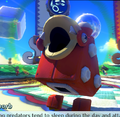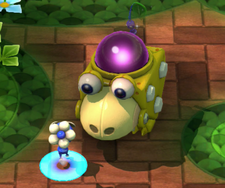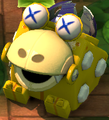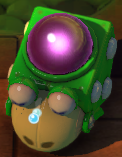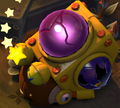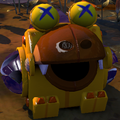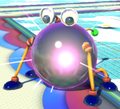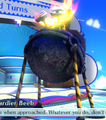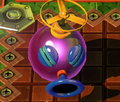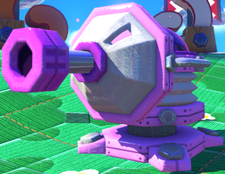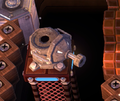Pikmin Adventure enemies: Difference between revisions
(Added Russian name meanings, pronunciation and translation notes (where applicable)) |
No edit summary |
||
| Line 3: | Line 3: | ||
{{guide}} | {{guide}} | ||
{{clean}} | {{clean}} | ||
{{needs translation|Dutch|French|Italian | {{needs translation|Dutch|French|Italian|Spanish}} | ||
This is a list of '''[[Enemy|enemies]]''' found in the ''[[Nintendo Land]]'' attraction ''[[Pikmin Adventure]]''. | This is a list of '''[[Enemy|enemies]]''' found in the ''[[Nintendo Land]]'' attraction ''[[Pikmin Adventure]]''. | ||
| Line 53: | Line 53: | ||
|SpaM = | |SpaM = | ||
|PorP = Orbolbo | |PorP = Orbolbo | ||
|PorPM = | |PorPM = From "orbe" (orb) and "bolbo" (bulb) | ||
|PorPN = | |PorPN = | ||
|Rus = Клубнеголов | |Rus = Клубнеголов | ||
| Line 149: | Line 149: | ||
|SpaM = | |SpaM = | ||
|PorP = Orbolbo Biliar | |PorP = Orbolbo Biliar | ||
|PorPM = | |PorPM = Bile Bulborb | ||
|PorPN = | |PorPN = | ||
|Rus = Желчный клубнеголов | |Rus = Желчный клубнеголов | ||
| Line 204: | Line 204: | ||
|SpaM = | |SpaM = | ||
|PorP = Baub Operário | |PorP = Baub Operário | ||
|PorPM = | |PorPM = Worker Baub | ||
|PorPN = | |PorPN = | ||
|Rus = Тапколап-рабочий | |Rus = Тапколап-рабочий | ||
| Line 255: | Line 255: | ||
|SpaM = | |SpaM = | ||
|PorP = Baub Bomba | |PorP = Baub Bomba | ||
|PorPM = | |PorPM = Bomb Baub | ||
|PorPN = | |PorPN = | ||
|Rus = Тапколап-бомбардир | |Rus = Тапколап-бомбардир | ||
| Line 307: | Line 307: | ||
|SpaM = | |SpaM = | ||
|PorP = Sopro Voador | |PorP = Sopro Voador | ||
|PorPM = | |PorPM = Flying Blow | ||
|PorPN = | |PorPN = | ||
|Rus = Толстый ветросвин | |Rus = Толстый ветросвин | ||
| Line 364: | Line 364: | ||
|SpaM = | |SpaM = | ||
|PorP = Sopro Telescópico | |PorP = Sopro Telescópico | ||
|PorPM = | |PorPM = Telescopic Blow | ||
|PorPN = | |PorPN = | ||
|Rus = Телескопический ветросвин | |Rus = Телескопический ветросвин | ||
Revision as of 15:04, January 2, 2025
|
The following article or section contains guides. |
|
This article or section needs to be cleaned up, either its format or general style. |
|
The following article or section needs help from someone who can translate Dutch/French/Italian/Spanish text. |
This is a list of enemies found in the Nintendo Land attraction Pikmin Adventure.
Bulborb
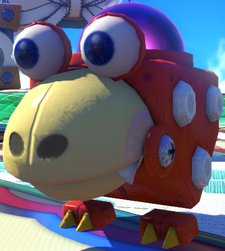
The Bulborb (チャッピー?, lit.: "Chappy") is the most common Bulborb variant found in Pikmin Adventure, being found in almost every level. It bears a resemblance to the Bulborb from the main Pikmin series, featuring three large white spots on its sides, large stalkless eyes that turn red when attacking, screws connecting the mouth to the main body, two small spots and a hole on its back to expel Bulborb Droppings, and lacks any legs connecting the body to the feet. The average Bulborb is slightly larger than the player, but there are larger and smaller Bulborbs that can be found in certain areas.
Behavior
The Bulborb can be found either sleeping or being sent into the area by a gashapon capsule before it starts walking towards a player. It has two walking speeds, a slow walk and a slightly faster walk that is replaced by an attack once the Bulborb is close to a player. Alongside this is a small hop that it can do to avoid attacks and quickly get close to players. Once the Bulborb is close enough to a player, it will either charge a dash in a straight line or attempt to eat a player depending on how far they are to the Bulborb. If the Bublorb is able to catch a player, it will toss them up, eat them, and turn them into a Bulborb Dropping, making it impossible for them to be properly whistled at or attack enemies. In this state, the player must be broken out either by Olimar or other Pikmin damaging the Bulborb Dropping or by entering a body of water. If the Bulborb is defeated while a player is bring eaten, the player will be sent flying out of its mouth.
Strategy
The only weak spot the Bulborb has is on its back, making it easy to throw Pikmin at or directly attack it. The Bulborb will try to shake off all of the Pikmin that are on its weak spot, causing them to be knocked over for a little bit. There are ways to circumvent the Bulborb's movement and shaking, however, either by waiting for it to slowly walk around, move out of its sight to make it look for any other players in sight, or wait for it to start panting. These are the ideal times to attack the Bulborb since it won't be able to shake off the Pikmin on its back until after it starts trying to move.
Monita's notes
Gallery
Names in other languages
| Language | Name | Meaning | Notes |
|---|---|---|---|
| チャッピー? Chappī |
Chappy | ||
| Bulborb | |||
| Bulborbe | |||
| Punktkäfer | Dot Beetle | ||
| Coleto | Bulborb | ||
| Orbolbo | From "orbe" (orb) and "bolbo" (bulb) | ||
| Bulbo | |||
| Клубнеголов |
Yellow Bulborb
|
Because this subject has no official name, the name "Yellow Bulborb" is conjectural. |
- This article is about the enemy in Pikmin Adventure. For the unused enemy, see Pikmin 2 prerelease information#Early bulborbs.
The Yellow Bulborb is a common Bulborb variant found in Pikmin Adventure, and acts as the first mini-boss in the attraction. It is almost identical to the Bulborb in appearance, but is colored yellow instead of red or green. Much like the red Bulborb, the Yellow Bulborb is typically found slightly larger than players but larger ones can be encountered in certain areas.
Behavior
The Yellow Bulborb, unlike other Bulborb variants, does not charge at far away players, instead, it shoots out a projectile to harm the player. On top of this, the Yellow Bulborb will hop around often to dodge attacks and get close to eat players.
The Yellow Bulborb can either spew orbs of water that ensnare players, rendering them helpless until they are freed, or a spike ball, which will take out a player that gets hit by it. If a player is trapped in a water bubble, they have to be freed by having other Olimar or orher Pikmin attack them, similar to the Bulborb Dropping.
Strategy
Due to being a variant of the Bulborb, it has a very similar method to defeat it. It will not shake off Pikmin when it is panting or when it is shooting projectiles, meaning they are good times to attack if the players are able to avoid the projectile.
Gallery
Green Bulborb
|
Because this subject has no official name, the name "Green Bulborb" is conjectural. |
The Green Bulborb is a semi-common Bulborb variant found in Pikmin Adventure. It is nearly identical to the Bulborb in appearance, except it is green instead of red or yellow. It often appears in groups, requiring players to either take on a small group of them, or in some cases, simply run away from them.
Behavior
The Green Bulborb, unlike the other Bulborb variants, can only charge at the players on sight and has no other methods of attack, but it can target the player when charging. Once it finishes a charge, it will start panting for a short amount of time.
Strategy
Because the Green Bulborb starts panting after charging, it is very easy to attack it when it isn't charging. When the Green Bulborb is charging however, it is advised to run away because the homing charge makies it difficult to attack without getting hit by it. If possible, one should try to lure charging the Green Bulborb into a pit or a small area to attack them from a safe area.
Gallery
Bilious Bulborb
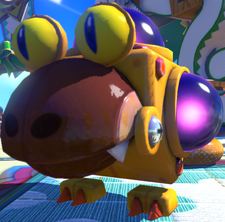
The Bilious Bulborb (テンテンチャッピー?, lit.: "Restless Chappy") is the rarest non-boss Bulborb variant found in Pikmin Adventure, and is the seventh mini-boss the player fights. Its thinner eyes and orange color scheme resembles that of the Orange Bulborb. It has smaller spots than the other Bulborb variants, so it is suggested by Monita that it may not be a Bulborb subspecies.
Behavior
The Bilious Bulborb shares most of the attacks that are used by the three standard Bulborb variants. It can shoot out spike balls and water like the Yellow Bulborb, except it shoots out 6 spike balls in different directions. It also charges in a straight line and pants afterwards like the red and green Bulborbs respectively.
Strategy
The best way to defeat the Bilious Bulborb is with multiple players. Have the Mii Olimar player run around it so the other Mii Pikmin can get to the weak-points dotting its back. If the arena has rocks or bombs nearby, Olimar or the Pikmin can pick them up to throw them at the Bilious Bulborb. If the rocks hit the creature on a weak-point or directly on its face, it will be stunned for a few seconds. If the bombs land close enough to the Bilious Bulborb, it can deal massive damage to all the weak spots at once. If utilized properly, the rocks and bombs can turn the tide in a losing battle and defeat the Bilious Bulborb.
Monita's notes
Gallery
Names in other languages
| Language | Name | Meaning | Notes |
|---|---|---|---|
| テンテンチャッピー? Tenten Chappī |
Restless Chappy | ||
| Galkleurige Bulborb | |||
| Bulborbe putride | Putrid Bulborb | ||
| Bleich-Punktkäfer | Pale-Dot Beetle | ||
| Coleto bilioso | Bilious Bulborb | ||
| Orbolbo Biliar | Bile Bulborb | ||
| Bulbo bilioso | |||
| Желчный клубнеголов | Bilious Bulborb |
Creepy Beeb
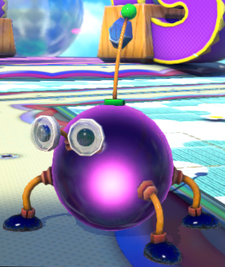
The Creepy Beeb (ザコワラジ?, lit.: "Small Fry Woodlouse"; known as the Worker Baub in the European version) is the most common enemy found in Pikmin Adventure. The standard appearance features a purple orb with four flexible yellow legs with black feet, stalked googly eyes, and a yellow and green antenna coming out of the top of its head. There is also a variant that features blue legs and yellow feet like the King Beeb, with the main design difference being a ring around the yellow tip of the antenna.
Behavior
When it is not attacking players, the Creepy Beeb will walk towards a player even if they are far from its spawning point. The Creepy Beeb attacks by rolling forward a short distance that can take out a player.
Strategy
The Creepy Beeb is the easiest enemy to kill in Pikmin Adventure, as it can die in one direct hit and get weighed down by a single Pikmin due to its entire body being a single weak-point. It only rolls forward a little bit, so avoiding its attack is very simple. Some Creepy Beebs take slightly more hits to kill, but are still very simple to get rid of as they still function identically to the small ones.
Monita's notes
Gallery
Four large Creepy Beebs resembling the King Beeb, with a Mii Blue Pikmin weighing one down.
Names in other languages
| Language | Name | Meaning | Notes |
|---|---|---|---|
| ザコワラジ? Zako Waraji |
Small Fry Woodlouse | ||
| Werkbaub | |||
| Brok rampant | Creeping beeb | ||
| Krümelkugelkäfer | Crumb Dot Beetle | ||
| Pidolino operaio | |||
| Baub Operário | Worker Baub | ||
| Boloide obrero | |||
| Тапколап-рабочий Tapkolap-rabochiy |
Worker Slipperfoot | Тапколап comes from тапок (slipper) and лапа (foot/leg) |
Bombardier Beeb
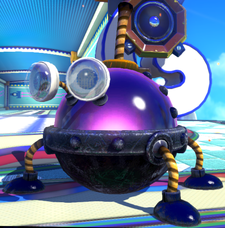
The Bombardier Beeb (サクレワラジ?, lit.: "Bursting Woodlouse"; known as the Bombardier Baub in the European version) is one of the rarer enemies in Pikmin Adventure. It is a variant of the Creepy Beeb that explodes after a few seconds of spotting a player. It has a number of common characteristics with the Creepy Beeb including black feet and stalked googly eyes, but it also has a few major design differences as well including rivets on its sides and a fuse in place of an antenna.
Behavior
Upon spotting a player, the Bombardier Beeb will activate the fuse on its head and chase after them. After about 5 seconds, it will stand in place and panic for a second before exploding, causing an explosion that can damage nearby players, enemies, and destructible blocks similar to standard bombs.
Strategy
It is not recommended to attack the Bombardier Beeb directly because of the short time it takes before exploding compared to the high amount of health it often has. Instead, the Bombardier Beeb can be used to the players' advantage to destroy other enemies and obstacles, but they must be careful to not get caught in the blast radius, or else they will be engulfed and taken out in the explosion.
Monita's notes
Gallery
Names in other languages
| Language | Name | Meaning | Notes |
|---|---|---|---|
| サクレワラジ? Sakure Waraji |
Bursting Woodlouse | ||
| Bombaub | |||
| Brok à retardement | ticking beeb | ||
| Knallkugelkäfer | Bang Ball Beetle | ||
| Pidolino bombardiere | Bombing Beeb | ||
| Baub Bomba | Bomb Baub | ||
| Boloide bomba | |||
| Тапколап-бомбардир Tapkolap-bombardir |
Bombardier Slipperfoot |
Blowhog
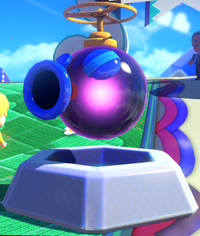
The Blowhog (フーセンドックリ?, lit.: "Balloon Tokkuri"; known as the Puffy Blowhog in the European version) is an uncommon enemy that appears in Pikmin Adventure. It is a purple orb with a blue snout that is lifted by a propellor and features eyes that are often covered up by its eyelids almost always being nearly closed.
Behavior
The Blowhog is usually found hovering still and looking in one direction. Once it sees a player the Blowhog will start to move towards them until it gets close enough to the player and turns its snout into a spike and tries to ram the players head-on in a straight line.
Strategy
Since the Blowhog's entire body is a weak point similar to the Creepy Beeb, attacking it is easier than most enemies. However, it is very mobile, making precision in throwing difficult, and it usually hovers over pits, making it difficult to throw Pikmin at it without losing them. The player can either attack it from afar with a Whip Seed or try to lure it over solid ground in order to safely take it out.
Monita's notes
Gallery
Names in other languages
| Language | Name | Meaning | Notes |
|---|---|---|---|
| フーセンドックリ? Fūsen Dokkuri |
Balloon Tokkuri | ||
| Opgeblazen Blowhog | |||
| Puffy volant | Flying puffy | ||
| Ballonerus | Ballonerus | there is no translation | |
| Moschita vacua | |||
| Sopro Voador | Flying Blow | ||
| Verraco volador | |||
| Толстый ветросвин Tolstyy vetrosvin |
Fat Windhog | Ветросвин comes from ветер (wind) and свин (pig) |
Telescoping Pumphog
The Telescoping Pumphog (ポンプドックリ?, lit.: "Pump Tokkuri") is a common enemy found in Pikmin Adventure. Its face bears a resemblance to the Fiery Blowhog, sharing very similar eyes and snout, but is otherwise very different, being a stationary tower that can pump out projectiles.
Behavior
Most Telescoping Pumphogs are completely stationary and are unable to do much of anything other than shoot projectiles while a few others can delve underground and pop back up to shoot projectiles and temporarily avoid damage from players.
When it is stationary, the Telescoping Pumphog sits about, facing a set direction. When it notices a player, it will start rising up, revealing its tube-like under-segment which inflates. It will then push down, which fires out a projectile from its snout. This projectile is usually a spike ball, but there are a few variants that shoot out bombs and water.
Strategy
The Telescoping Pumphog's weak-spot is located directly on its head, making it hard to attack when it rises up to charge its attack. However, when it is on the ground, right after attacking, it is extremely vulnerable, so it is advised to attack them then.
It should be noted, however, that some variants of the Telescoping Pumphog do not have a weak-point at all, making it the only enemy in Pikmin Adventure that is completely invincible. If a player comes across this variant, their only option is to advance to the next part of the level quickly while avoiding the indestructible Pumphog's projectiles.
Monita's notes
The Telescoping Pumphog statue extending upward.
Names in other languages
| Language | Name | Meaning | Notes |
|---|---|---|---|
| ポンプドックリ? Ponpu Dokkuri |
Pump Tokkuri | ||
| Blaasbalgblowhog | |||
| Souffy téléscopique | Telescopic huffy | ||
| Pump-Ballonerus | Pump-Ballonerus | ||
| Eruptor telescopico | |||
| Sopro Telescópico | Telescopic Blow | ||
| Verraco fuelle | |||
| Телескопический ветросвин Teleskopicheskiy vetrosvin |
Telescopic Windhog |
Bosses
There are the following bosses in Pikmin Adventure:
- Bulblord
- Large-Mouth Wollywog
- Emperor Pinchipede
- Bladed Beeb
- Grand Bulblord
- Translucent Wollywog
- Monochromatic Pinchipede
- Greater Studded Beeb
